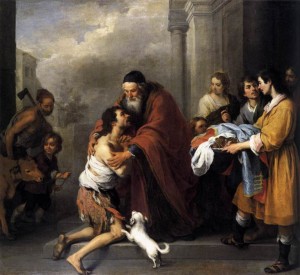Thoughts on Today’s Lessons for March 6, 2016

The Return of the Prodigal Son, Bartolomé Esteban Murillo, Spanish, 1617 – 1682. Oil on canvas, The National Gallery
Themes of fresh starts and new beginnings unite all of today’s readings. From the Israelites’ arrival at the Promised Land to the Prodigal Son’s return home, we hear that God is with us through transition; God stands at our side in time of change. In our first reading, the people share the joy of reaching Canaan at last. After 40 years in the wilderness, their slavery in Egypt is now only a memory, and they will begin to enjoy the fruits of the land’s bountiful harvest.
We don’t always do the right thing. In our hearts we know this, even as we feel the pain of knowing that we have wronged another, or hurt a loved one. When we step away from the God who loves us and who always stands ready to forgive, our guilt piles up, and we groan in sorrow. When we repent – literally, when we stop being stubborn and turn back from our wrongful ways to trust in God – then we feel the comfort and joy of knowing God’s forgiveness.
Second Reading: 2 Corinthians 5:16-21
Our new direction as Christians, Paul says, comes when we recognize Jesus not only as human but as Christ, the Son of God, the Messiah. In Christ everything old has passed away. Everything has become new! Through Christ God forgives all our trespasses and reconciles the world to God. In making this point to a community that has been quarreling with him and with each other, Paul reminds them to forgive and be reconciled, just as God has done with us through Jesus.
Gospel: Luke 15:1-3, 11b-32
Just about everyone remembers the parable of the Prodigal Son, and it’s easy to grasp its meaning: God forgives us when we stray and then return. Even if we have been prodigally sinful, God welcomes us home with a father’s joy and abundant celebration. But wait! There’s more: Look at both ends of the story. At the close, the older brother, hurt because his good behavior won him no praise, is reminded of his father’s loyal, long-standing love. And at the beginning, we hear that Jesus told this story to remind the scribes and Pharisees that a sinner’s return deserves as much celebration as the recovery of a lost sheep.
